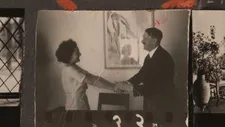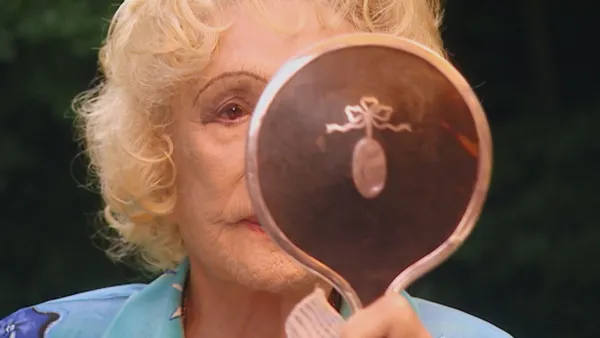 |
| Leni Riefenstahl checks her appearance for the recording of the three-part documentary "Speer Und
Er" by director Heinrich Breloer Photo: Bavaria Media |
Director Andres Veiel turns his attention to the notorious artist, filmmaker and Nazi propagandist Leni Riefenstahl. With access to her estate, his documentary, Riefenstahl, uses previously unseen photographs, written documents, audio recordings as well as unpublished handwritten notes and excerpts for her biography. Veiel sifts through these to construct a thoroughly detailed portrait of the woman synonymous with one of history's darkest chapters.
Veiel's filmmaking has explored a range of subjects from an Israeli-Palestinian theatre group in Balagan (1994), the critical exploration into the identities of far-left militant terrorist Wolfgang Grams and Alfred Herrhausen, the banker whose murder Grams was suspected of, and If Not Us, Who? (Wer Wenn Nicht Wir, 2011), a drama about a German couple who become part of the far-left militant Baader-Meinhof Group. He has also directed Bueys (2017), a biography about the German sculptor and performance artist Joseph Beuys.
In conversation with Eye For Film, Veiel discussed the challenges of Riefenstahl's lies and his decision to show his subject empathy, in spite of her own empathetic indifference. He also reflected on trying to uncover who Riefenstahl really was and what she means today.
The following has been edited for clarity.
Paul Risker: What first brought you to the subject of Leni Riefenstahl as the basis for a feature documentary?
Andres Veiel: It was the chance to approach her estate. I learned from Sandra Maischberger, the film's producer, that she had access to 700 boxes which were handed over to three museums in Berlin. There were I guess around 200,000 photos. And the number of documents, like diaries and drafts of her memoirs, and the number of files because she sued a lot of people. She had 50 lawyers, so you can imagine. There were also the cutouts from the editing process of Olympia (1938), for example, as well as a lot of private films because her later husband, Horst Kettner, would film her. He even filmed her after she had a helicopter accident and was in hospital and even in the moments when she was close to death.
We had a lot of insight, and, of course, I knew from the beginning she was a manipulator. I was curious to look into the details and the contradictions of how she constructed the lies, or the fake news of the legends she created.
So, it was curiosity to learn who Leni Riefenstahl really was through access to her estate, and what does she mean today? These were the leading questions for the film.
PR: As you say, Riefenstahl was manipulative. Your approach is to listen to her and expose the contradictions and lies through evidence uncovered in the vast archives. A salient point to raise, however, is that Riefenstahl was an actress.
AV: […] She was using the tools of an actress by showing herself as a victim. She is, in a way, the Jew. Once she said, "The Jews will pursue me till the end of my life." What she does is turns the role of the perpetrator upside down, and second, she works with charm. If a critical question comes up, she tries to sweet talk the interviewer — "Have another coffee." The third strategy was intimidating people. If they ask a critical question, she shouts, she cries, she gets aggressive, and she intimidates the person asking her these questions.
Riefenstahl uses the means and methods of an actress, and it's amazing how successful she was at achieving what she wanted to achieve — controlling the storytelling in her biography. And the interesting point for me was not the moral question that she lies, because she has the right to lie. The interesting point was when did she shift or change the story in her biography? For example, you see she was a war correspondent in Poland, and she was an eyewitness to a massacre [of Jews in the Polish town of Końskie]. But at a later denazification trial, she said she'd learned about the atrocities of the Holocaust after the war. You see the necessity for lies, and you see how the lie became a new version of the truth.
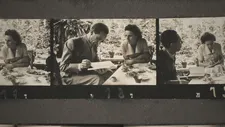 |
| Riefenstahl Photo: Vincent Productions |
It's hard work creating a lie or a legend, to somehow step-by-step merge the lie with the truth, till a new truth is born. For me, she's a prototype for fascism, and how she became that was a core question at the beginning of making the film.
PR: The film only briefly explores Riefenstahl's youth, and her relationship with her parents. Was there a reason why you decided to give little focus to her formative years?
AV: I tried to find the key moments, of which there were two. One was experiencing her father's violence, who threw her into the water to teach her how to swim. She had to learn, but in a very existential way, you could even say brutal way. She was supposed to die in the water.
So, the interesting question was her reaction to that experience in the drafts of her memoirs. She didn't write about how unbearable or aggressive her father was or that he was a tyrant. No, she wrote, "Afterwards, I became a good swimmer."
In a way, she said yes to the violence, because it helped her to become stronger and to have some sort of supremacy. And at the same time, I would call it the core of her aesthetics. It's not only the celebration of the strongest, but contempt for her own weakness and, later on, weakness in a general way, such as the contempt for the so-called handicapped sick people, who can't show the perfect beauty of a strong body. This is, for me, the dark side of this aesthetic approach.
You can also see there's something of a pattern in her youth. I won't say there's a reason, but you can at least see there's a glimpse of recognition of the impact of the First World War veterans. Udet, one pilot, said, "We came out of the ashes of the First World War. The weak soldiers broke down, but we came out even stronger." This was a precondition to assemble under the flag of the Führer. So, you see the straight line between the celebration of strength and contempt towards all the so-called sick and weak people, and that's the core idea of the scapegoating of fascism.
PR: Riefenstahl is a tragic character, and I question whether she ever looked at herself and honestly reflected on who she was or how she'd become defined by the choices she had made.
AV: Yes, it's a tragedy. Riefenstahl is a tragic figure because of her refusal and denial of any reflection regarding her own role. She was just petrified.
As a filmmaker, I always said I wanted to show her as a human being and not just point at her, stage a tribunal and say she's the incorporation of evil. The real challenge was to consider her because she's one of us. She comes from the middle of society, and she's a prototype of the total lack of empathy, and that's something we are now experiencing every day in all the different political levels. And that's the reason why we have to consider Leni Riefenstahl— she's a warning about how easy it is to be seduced.
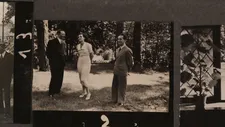 |
| Riefenstahl Photo: Vincent Productions |
The reason why she is a case study for this type of seduction is because of our longing for lies, legends and the simplicity of good and evil in storytelling, and for scapegoating. The problem is not these political leaders that we follow but this longing, and this is why it was necessary to make this film.
In the beginning, I thought let's look at Leni Riefenstahl as an interesting historical character, and step-by-step, the deeper I went into the estate's archives, the more present it was for me.
PR: Watching Oliver Hirschbiegel's Downfall, I appreciated the way he communicated the tragedy of this shell of a human being who'd sacrificed his humanity. I'm not condoning Hitler's horrific crimes by suggesting we should pity him, but watching your film, I felt there was a glimmer of a similar intent.
AV: It's a tightrope walk because I wanted to understand who Leni Riefenstahl was, but that doesn't mean to exonerate her. We were talking about the experience of her father's violence, which she also experienced with her first lover and then [Joseph] Goebbels, and later on, which is not in the film, her first husband. So, the question is, at what point in the film can we insert these?
It was a challenge because sometimes we tried to do it after the Końskie episode. She can be seen as not only a witness but a catalyst of the massacre, by giving stage direction to push Jews out of the image she was photographing. You wanted to show this, but at the same time to understand why she became what she was. And that's important, because if we just stage a tribunal, you can point at her and exclude her so that she has nothing to do with us. But she has a lot to do with us, and she's current in her lack of empathy and the construction of fake news. She's a master of it, and that's why we have to deal with her.
PR: There's an interesting section of the film that documents Riefenstahl's appearance on a 1970s German talk show, which saw an outcry of sympathy from audiences who reached out to her.
AV: The phone calls and the taped recordings are interesting because they show a specific attitude. In the 1970s, in Germany, there was a feeling that we were fed up with dealing with the Nazi past, and with Leni Riefenstahl, to celebrate her as an innocent artist. It was a way of wanting to escape from this dark shadow. So, it's a portrait of Germany at this moment, but it's also a portrait of the present day, because we just had a survey in Germany where more than 50% said we are fed up with talking about the Nazi era. Somehow there is a denial of the past, a wish not to be confronted by it or to learn the lessons of the past.
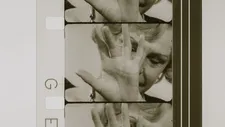 |
| Riefenstahl Photo: CBC |
I always say history doesn't repeat itself even if it's similar, but we have to deal with it because some basic structures of fascism, such as the celebration of strength, the contempt for weakness and the necessity to separate the two, are always the act of scapegoating. These elements are present today, and so, it's a chance to make a detour by looking at an historical figure that can free us.
[…] We could have made a caricature out of her by just showing her in the bathtub, flirting at the age of 85 with her lover or other things like that. But no, we let her keep her dignity, and we even tried to approach her with empathy, which she denied others. We did this because it makes her more dangerous in the present, with all her lies and the legends she created — she's one of us.
I have to admit that it was a challenge, because the repetition of lies and legends could make it unbearable to continue. It's a question of dramaturgy and I miss the third act, which is normally cathartic by finding some distance or at least being at the beginning of a reflection. But there's none and that's a challenge. On the other hand, it shows something which is topical and current, and it gives us a chance to understand more about the subject.
Riefenstahl is released theatrically in the UK and Ireland from May 9th.








